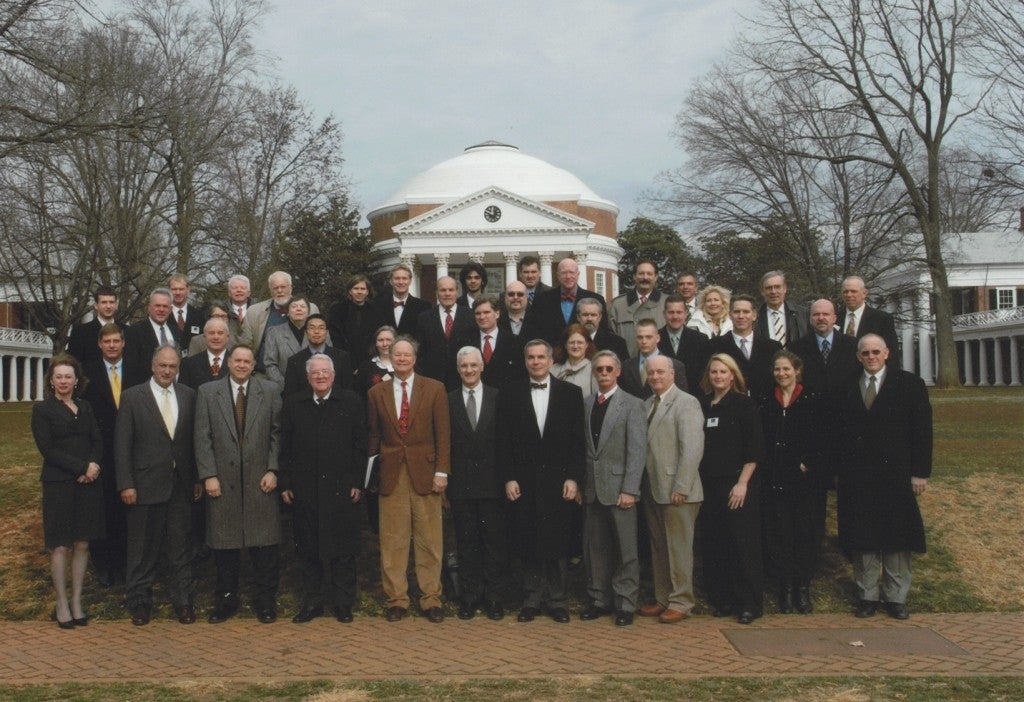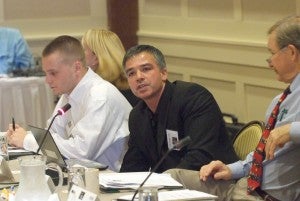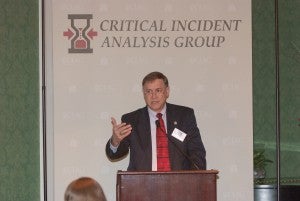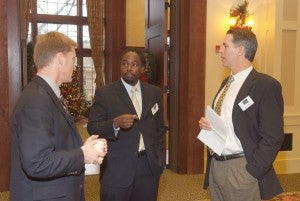Spring 2008 – Suicide by Cop: Averting the Crisis

Symposium Description
University of Virginia
Charlottesville, Virginia
December 7 – 9, 2008
Underwritten by the Law Enforcement Legal Defense Fund
According to the US Department of Justice, approximately 375 people are shot and killed by law enforcement officers every year. While the vast majority of these shootings are defensive acts employed by officers in the line of duty, a small subset can be identified as “suicide by cop” (SBC). Suicide by cop presents itself as a critical incident due to the resounding impact it can have on the individuals involved, as well as on the community in which it occurred. The lack of proper protocol for such events only serves to magnify the confusion regarding the necessary and proper steps to be taken to ensure both legal and psychological well-being. In late 2008, a special symposium entitled, “Suicide by Cop: Averting the Crisis,” was convened by CIAG to address these issues.
SBC Symposium Highlights
Distinguished Guests
- Hon. Edwin Meese, III – Mr. Meese served as Counselor to President Ronald Reagan from 1981 until 1985, after which he was appointed Attorney General, a post he held until 1988. Currently Mr. Meese holds the Ronald Reagan Chair in Public Policy at the Heritage Foundation where he is also Chairman of the Center for Legal and Judicial Studies. He is also a Distinguished Visiting Fellow at the Hoover Institution at Stanford University.
- Robert Blecksmith – Currently the Assistant Director of the Federal Bureau of Investigation’s Critical Incident Response Group (CIRG), Mr. Blecksmith has been with the FBI since 1985. Designated the first Deputy Assistant Director of CIRG in 2007, he was appointed Assistant Director in 2008 by FBI Director Robert Mueller. Mr. Blecksmith has had considerable experience in counterterrorism as well as weapons of mass destruction policies.
- Roger Depue – Dr. Depue joined the FBI in 1968 where he investigated organized crime, fugitive, kidnapping, and extortion cases. Promoted to Chief of Behavioral Sciences in 1980, he was appointed the FBI’s first administrator to the National Center for the Analysis of Violent Crime in 1984. He retired from the Bureau in 1989 and founded The Academy Group, Inc., a consulting firm that engages in forensic behavioral sciences. Dr. Depue is currently a consultant to the National Criminal Justice Command College at the University of Virginia and is an internationally renowned author.
- Eugene Methvin – A lifelong journalist, Mr. Methvin joined Reader’s Digest as Associate Editor in 1960 before becoming Senior Editor. He remained at the magazine fulltime until 1996 and continued working part-time as a contributing editor until 2002, when he officially retired. Because of his commitment to journalistic excellence, Mr. Methvin was inducted into the D.C. Chapter of the Society of Professional Journalists Hall of Fame. Mr. Methvin has authored two books.
- James Reinhard – Dr. Reinhard is a Distinguished Fellow of the American Psychological Association as well as the Vice President of the National Association of State Mental Health Program Directors. He also serves as a board member on the Council of State Governor’s Justice Center. In 2001 Dr. Reinhard was appointed Assistant Commissioner of the Facility Management to the Virginia Department of Mental Health, Mental Retardation and Substance Abuse Services (DMHMRSAS). Since 2002 he has served as Commissioner of DMHMRSAS.
- Kris Mohandie – Dr. Kris Mohandie is a police and forensic psychologist with over nineteen years of experience in the assessment and management of violent behavior. He has worked in field responses and case investigations for local, state, and federal law enforcement organizations including LAPD’s Threat Management Unit and SWAT/Crisis Negotiation Team. He consults regularly on workplace violence, extreme violence, college and university and K-12 school violence, stalking, and threat cases in the private and public sectors through his company, Operational Consulting International, Inc. Dr. Mohandie has authored numerous psychological studies and is the author of School Violence Threat Management.
Key Panels and Discussions
The conference discussions began by focusing on the term, “suicide by cop” both in its conceptualization and its consequences for law enforcement in terms of preparation and control. By properly renaming and defining the phenomenon, the analysts hoped to encourage more research which might lead to different training practices for law enforcement officers to better react to and prevent such events. The term “suicide by cop” was decided to be inappropriate as it fails to accurately depict and define the experience and implies fault without acknowledging the officer’s obligation to act with the appropriate lethal force. The pejorative use of the word “cop” conjures negative stereotypes and fails to convey the fact that the deceased as well as the officer and the deceased’s family are victimized by the occurrences of the event. Left with the guilt of having killed a person, officers often report feeling “used” by the perpetrator, to whom the term “suicide by cop” makes no reference.
Three basic categories of offenders who commit suicide by cop were identified by the discussion: individuals with suicidal tendencies who suffer an immediate and acute psychological crisis, individuals with rage towards the world, and individuals caught in the act of a crime who desire more control over their fate than the justice system would afford. The perpetrators are rarely afflicted by any long-term psychological disturbance, such as depression, that would precede their actions. Incidents are seldom premeditated and resulting autopsies frequently reveal the presence of drugs, most often alcohol or amphetamines, which contributed to the danger and the volatility of the situation. A clear distinction was made between individuals who are actively suicidal and act with the ultimate goal of death and those who are merely willing to accept death as an outcome of their actions. Recognizing the ability for these factors to act as misnomers of the phenomenon creates better understanding of the actual event.
The events following a suicide by cop can be chaotic and stressful. While some precincts work hard to ensure the process runs efficiently, others are less prepared to react, which can be detrimental to those affected. This lack of standardized protocol can severely hinder proper investigation and psychological aid. In some cases officers involved are immediately sequestered and questioned, with these sessions often lasting for hours, making them feel as though they have been accused of a crime. Officers can end up feeling alienated and blamed for doing their duty. This treatment only increases guilt assumed by the officers. It is therefore imperative that leadership should avoid stigmatization of the officers involved, since the manner in which officers are treated can dramatically affect their future performance. The lack of clearly defined protocol for a suicide by cop situation only serves to magnify the chaos of the event. Officers can end up alienated and feel blamed for doing what they believe was their “duty.”
However, the psychological stress caused by the event itself as well as the subsequent investigation can be greatly alleviated by following the proper procedures. Analysis of the suicide by cop phenomenon revealed the importance of debriefing on the well-beings of those involved. Psychological counselors should be available following such a traumatic event to help guide officers on an individual level and to advise on possible physical effects such as sleep disruption. Equally valuable to the process of recuperation is the social support of other officers who have been involved in similar shootings.
In addition to being psychologically stressful to those directly involved, a suicide by cop event can cause significant damage to the community at large and can potentially strain relations between law enforcement and the general public, especially if the deceased was a minority. Tension can be avoided or greatly reduced through effective communication between the community and law enforcement. Although complete transparency during a suicide by cop investigation is not possible, actively engaging with the public can help maintain positive relations. Educating the public about police work and suicide by cop incidents can foster additional understanding and improve relations. Furthermore, a sense of collaboration and transparency maintained between the police and the media can help to prevent unfiltered opinings which could have a detrimental effect on investigations and on public relations.
Discussion also focused on advice for training officers in order to proactively manage occurrences of suicide by cop. Training officers in real world scenarios can have a profound effect on their performance in the field. Similarly, instruction of techniques for dealing with individuals who may be mentally disturbed should be emphasized so that officers can respond more appropriately to the situation. Commanding officials can also better address such situations by establishing a protocol that not only guides the process of a suicide by cop investigation but does so with as little psychological stress to the officer as possible. Finally, officers leave the academy with tactical proficiency and a working knowledge of procedures, but no real understanding of the psychological or psychosocial tension that they may face on a daily basis. It is important to impart this knowledge not only for preparedness’s sake, but also to provide officers with a strategy for emotional wellness following stressful events
Representative Insights
“Have we planned what an appropriate response to the community and to the media will be when officers kill or are said to have been responsible for suicide by cop with this young tenth grader [who] is shooting others?” – Roger Depue
“Training people to respond differently to people who are mentally ill, emotionally disturbed, up against it, drunk, high, mentally retarded is something that you have to make safe as leaders, that police chiefs have to make safe as leaders, by saying, ‘We approve a different way of responding to this kind of citizen.’” – Joel Dvoskin
“When we add the term ‘suicide by cop,’ we can’t forget that we’re talking about a policeman who was forced to take someone’s life.” – Edward Davis
“Let [the media] know what kind of pressure law enforcement, whether it be an officer, the first responding officers, if it turns into a barricade situation, let them know the stress that law enforcement is under.” – Mike Brooks
“When…suicide occurs, anybody that witnesses it has the potential to have symptoms related to it.” – Julie Cerel
“Suicide is notorious for being something that is extraordinarily difficult to predict.” – Robert Bossarte
“We’re not doing the training in many of the agencies that we should be doing, just so they understand. We do a lot of criminal domestic violence training. But we do very little of this general training, where you’re dealing with a person in crisis.” – Neal Dolan
Conference Images
- Ed Davis makes the symposium’s first presentation to the group, in the U.Va. Board of Visitors’ Room.
- Kris Mohandie addresses the group.
- FBI Assistant Director Bob Blecksmith addresses the conference participants.
- Mike Brooks asks a question of Mr. Blecksmith.
- Ed Meese, Greg Saathoff, and Joel Dvoskin react to a humorous remark from across the hollow square.
- Sean Joe, Wade Myers, and Chris Holstege discuss the proceedings during a break.
- David Martin, Chairman of the Law Enforcement Legal Defense Fund, addresses a question following a panel discussion.
- Discussions at the conference square continue on the symposium’s final day.








